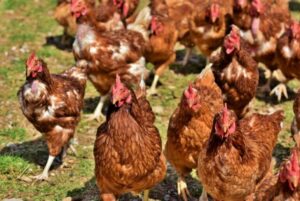In the past two years, there has been an alarming increase in cases of avian influenza, heightening concerns about possible transmission to humans, the EODC said in an update.
As of 2022, outbreaks of H5N1 influenza in birds have been recorded on five continents, causing the death or health disaster of more than 131 million domestic birds. In 2023, outbreaks expanded to another 14 countries, mostly in the Americas. It is presumed that the Americas are most severely affected in the latter period (2023-2024) because wild birds there have had no previous contact with the virus and therefore have not developed any immunity, unlike in Europe where extensive outbreaks occurred in previous years (2021-2022).
Outbreaks of avian influenza have been recorded in Greece in the recent past, which are briefly listed below:
2006:Cases of H5N1 were detected in wild birds, mainly swans, in various areas of Macedonia and Thrace.
.
2016-2017:Cases of H5N8, H5N6, H5N5 in farmed and wild birds were recorded in Central Macedonia, Western Macedonia, Thessaly, Peloponnese, Central Greece and Epirus.
2021:Cases of H5N8 in wild birds in Central and Western Macedonia.
2022: H5N1 cases mainly in wild birds in Eastern Macedonia & Thrace, Central Macedonia, Western Macedonia.
Human infections remain scarce and cases almost without exception have a history of unprotected contact with infected birds or exposure to the environment where they are reared. To date (May 2024), there have been 887 human cases of H5N1 influenza with 462 deaths (52% mortality), the vast majority in South-East Asian countries. The risk to the general public remains low because the virus is not easily transmitted from birds or animals to humans, there is no ongoing transmission between humans, existing antivirals are effective and available vaccines, both those intended for the period before a potential pandemic (pre-pandemic) and those for the event of a pandemic (pandemic), appear to offer adequate immunity from circulating strains of the virus. However, the continued genetic evolution of the virus poses a constant risk and requires constant vigilance.
In Europe, the H5N1 subtype and in particular clade 2.3.4.4b is predominant. In the four months from December 2023 to March 2024, influenza A(H5Nx) outbreaks were detected in 227 domestic farms and 414 wild bird cases in 26 European countries.
The country’s public health agencies are preparing in the following ways:
Strengthening surveillance in hospitals and primary health care. Patients with a picture of influenza or pneumonia of unknown cause are being investigated for a history of contact with birds or specific animal species. In addition, attention shall be paid to unexplained neurological manifestations and/or conjunctivitis, symptoms that have been observed in recent human infections or are considered likely because they have been observed in mammals. Suspected cases are fully investigated for the virus subtype at the National Influenza Reference Laboratories.
Maintain close cooperation between veterinary and medical services. Direct flow of information in the event of a potential outbreak in birds or animals, cooperation in the registration of exposed individuals, exchange of data between human and veterinary laboratories on virus characteristics and assisting epidemiological investigation in the event of human infections are sought.
Develop a detailed operational action plan with a clear description of the role of each actor involved. The HPAI developed a prevention-response-survival protocol for avian influenza taking into account all the latest data. In the near future (July), a cross-sectoral paper exercise involving several stakeholders will be carried out in order to enhance effective cooperation and preparedness of services in case of a possible outbreak of A(H5N1) in birds, animals or humans.
Information on prevention measures for people working in high-risk areas.
The EODY maintains informative material on the Avian Influenza page aimed at poultry workers, slaughterers, workers, transporters, cleaners, domestic poultry owners, veterinarians and hunters https://eody.gov.gr/disease/gripi-ton-ptinon/.
.
Ask me anything
Explore related questions





